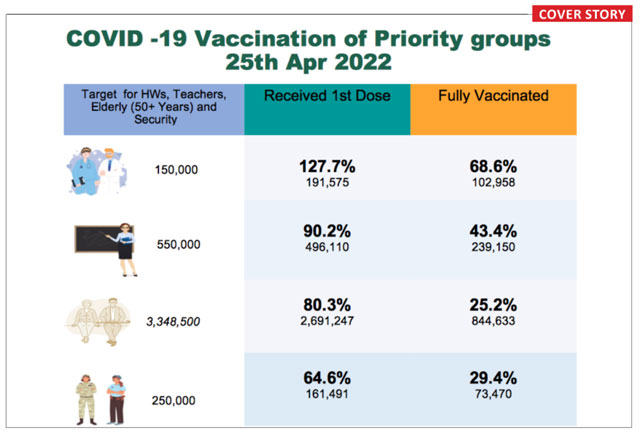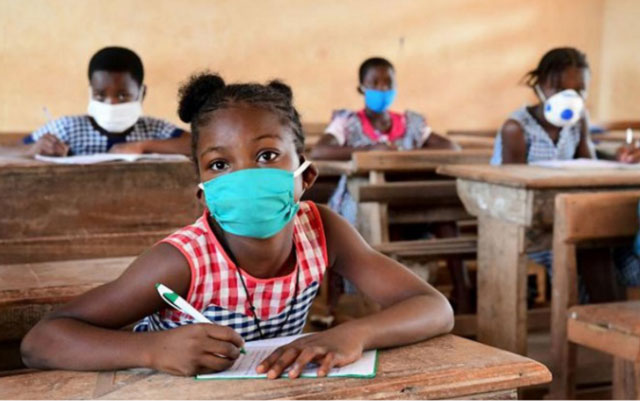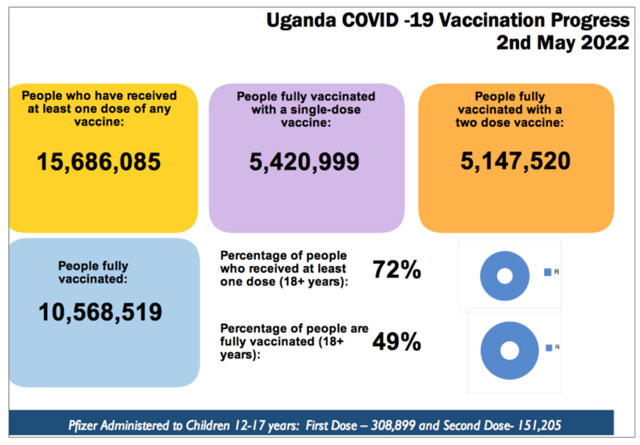
The Coronavirus is still around, and there will be another wave – Experts
COVER STORY | RONALD MUSOKE | The government will start vaccinating 6.6 million children aged 12-17 years when the new school term opens on May 9, according to Dr. Daniel Kyabayinze, the Director Public Health Services at the Ministry of Health.
The school-based vaccination programme follows what the Ministry of Health says has been a successful vaccination campaign against COVID-19 among the general public around the country. It is the latest indication of how the government intends to keep schools safe.
“The children are going to be vaccinated because they can fall sick and spread the disease so there are benefits of vaccinating that age group,” Dr. Kyabayinze said May 4 in Kampala during a media briefing on the Vaccine Advocacy Accelerator-Uganda (VAX-Uganda) project which is aimed at accelerating fair and equitable distribution of vaccines in Uganda.
It is being implemented at Mbarara University of Science and Technology (MUST) in collaboration with the Massachusetts General Hospital, Global Health Collaborative and HEPS-Uganda; a Kampala-based health rights non-profit.
Dr. Kyabayinze, who is an expert in monitoring infectious diseases, says despite the public perception about “the disappearance of COVID-19,” the Coronavirus is still around and experts are certain there will be another wave.
He explained that COVID-19 is a type of influenza and like all influenzas; COVID-19 comes in waves and spikes. “At the moment, China has some cities under lockdown so we know that it will come,” he said.
“It took us about six months to get our lockdown. So, if people are not vaccinated, we surely know it will come. But when is the best time to vaccinate? When there is no disease.”
“You don’t prepare for a fire outbreak when your house in on fire. No, you put fire extinguishers and sprinklers before the fire comes. It’s prudent to prepare before trouble comes.”
Kyabayinze said the government has decided to use the Pfizer vaccine because it is the vaccine that has been extensively studied.
According to government statistics, over 14,000 children have contracted COVID-19 since the onset of the pandemic in the country. Vaccinating children will, therefore, help reduce the risk of spread of COVID-19 within schools, spread to the parents and guardians and prevent absenteeism and closure of schools.
The Ministry of Health working in conjunction with the Ministry of Education and Sports, Ministry of Local Government, and the districts will provide details of the school-based vaccination programme. Meanwhile, Ministry of Health officials say eligible children who are out of school will also be vaccinated within the vicinity of the school.

Speaking at the same function, Dr. Tabley Basajjatebadiba Bakyaita, the Assistant Commissioner Health Services in charge of health communication at the Ministry of Health, said the government will continue vaccinating Ugandans as long as COVID-19 remains a public health threat.
“When you look at the childhood diseases that the government immunizes against, there are some diseases like Diphtheria whose manifestation in children is no longer apparent but it is still being managed by vaccination. Similarly, we shall continue vaccinating against COVID-19 as long as it remains a public health threat.”
Successful vaccination exercise
On March 10, last year, the government began a massive vaccination programme that would see close to 22 million people or 49.6% of the country’s population inoculated against COVID-19 in a phased approach. At the time, priority was given to all the country’s health workers (150,000), all teachers (550,000) and personnel of the armed forces (250,000).
The other priority category comprised 3,348,500 people who are above 50 years of age and close to 500,000 people who are above 18 years but with underlying health complications (hypertension, diabetes, and cancer, organ diseases such as liver, kidney or heart disease).
Later, other emerging high risk and priority essential groups such as employees in airlines and media, prisoners, tour operators and guides, bankers, immigration officers, staff of the Uganda Wildlife Authority and Uganda Revenue Authority and humanitarian workers were added.
Although there was a lukewarm response at the beginning of the exercise owing to negative information about the vaccines, the programme picked up months later after the virulent Delta variant of the Coronavirus swept through the country and killed thousands of people.
According to Ministry of Health statistics, as of May 2, this year, about 20.9 million doses of COVID-19 vaccines had been administered to people around Uganda. Those who had taken at least the first dose were about 15.7 million people while those who were fully vaccinated were 10,568,519 people.
This figure includes the 5,421,000 people who were vaccinated with the single shot of Johnson & Johnson vaccine. The total number of people so far vaccinated represents a percentage of 49% of the targeted population.
As of April 25, close to 191,575 health workers (127. 7%) had received their first dose while 68.6% (102,958) were fully vaccinated. Of the targeted 550,000 teachers, 90% (496,110) people had received their first dose while 43.4% (239,150) had got the two doses.
Of the 3,348,500 elderly people targeted, 80.3% (2,691,247) people had received at least one dose while those who had got fully vaccinated were 25.2% (844,633) people. Meanwhile, only about 65,835 people have taken their booster dose.

In terms of gender dynamics, among the fully vaccinated population, 52% are women while the rest are men while 55% women and 45% men have got at least one dose of the vaccine. The elderly population (those aged 50 years and above) have been the most responsive to the government programme (58%), followed by those aged 40-49 (53%), those aged 30-39 (49%) and those aged 18-29 (43%). Only 1% of people aged 0-17 years have been fully vaccinated.
Private health facilities involved
While presenting the latest COVID-19 situation update in Uganda on April 27, Dr. Jane Ruth Aceng, the Minister of Health, said the country has sustained low transmission of COVID-19 with a positivity rate of less than 2% since February, 2022.
This, Dr. Aceng said, is attributed to the early decisive and sustained measures put in place to curb the spread of COVID-19 and the cooperation of all Ugandans to adhere to these measures, including taking up COVID-19 vaccination.
She said the only known COVID-19 patients on admission in hospital at the time were two, one at Mulago National Referral Hospital, and another at St. Mary’s Hospital, Lacor, in the northern Uganda city of Gulu. Both patients had never been vaccinated, she said.
However, despite the gains and the impressive epidemiological picture in Uganda, early this month, the World Health Organisation (WHO), and the Committee of the International Health Regulations maintained COVID-19 at the highest level of classification; a public health emergency of international concern—that was declared in January 2020 and a pandemic on March 11, 2020. In addition to the emerging transmission dynamic in the southern African countries and parts of Asia, the worst is not yet over, Aceng said.
“As we observe the global picture, we continue to remain on high alert for any potential flaring of the pandemic; while maintaining the response tempo until we are convinced that the threat is sufficiently downgraded,” she said.
Dr. Aceng urged health workers, District Health Officers (DHOs), Resident City Commissioners (RCCs), Resident District Commissioners (RDCs) and city mayors to take leadership of the vaccination exercise.
She said it is their responsibility to ensure that the vaccination exercise at the district level takes place in a smoother manner, that all individuals aged 18 years and above receive their doses, and that districts that have not used up their vaccines are supported to do so.
She said there is also need to remind health workers to follow the mix-and-match schedule of vaccines depending on the vaccine availability. Aceng said individuals who have completed six months after their last COVID-19 vaccination should get a booster shot.
“The booster shot provides additional protection against COVID-19,” Aceng said, “While COVID-19 positivity has greatly reduced, please be reminded that the deadly disease still exists amongst us. It is your responsibility to maintain good hygiene and get vaccinated.”
Uganda has so far acquired 44 million doses of COVID-19 vaccines, three million of which were bought by the government. To effectively vaccinate all Ugandans, however, the government needs 119 million doses of COVID-19 vaccines. These will be enough to vaccinate people who are five years and above in this country, Aceng said.
Dr. Kyabayinze told The Independent that besides following up with regional partners to do mop-up vaccination exercises, the ministry is also engaging with private health facilities to take care of the needs of people who prefer getting vaccinated in health facilities whose ambience fits their status.
“We shall put vaccines in the private health facilities to help people who don’t want to line up. They can now go and get vaccinated in health facilities of their convenience,” Kyabayinze said.
Kenneth Mwehonge, the executive director of HEPS-Uganda says the Vaccine Advocacy Accelerator Project intends to promote equitable access to COVID-19 vaccines and ensure that every Ugandan is vaccinated.
Mwehonge told The Independent that the project will be advocating for vaccine production waivers to increase production of generic vaccines and their distribution and supply.
“Historically, we have learnt that influenzas don’t go away; they tend to stay with us and the best defence against them is vaccination. So, this project is there to support the government to ensure full vaccination of Ugandans.”
 The Independent Uganda: You get the Truth we Pay the Price
The Independent Uganda: You get the Truth we Pay the Price


